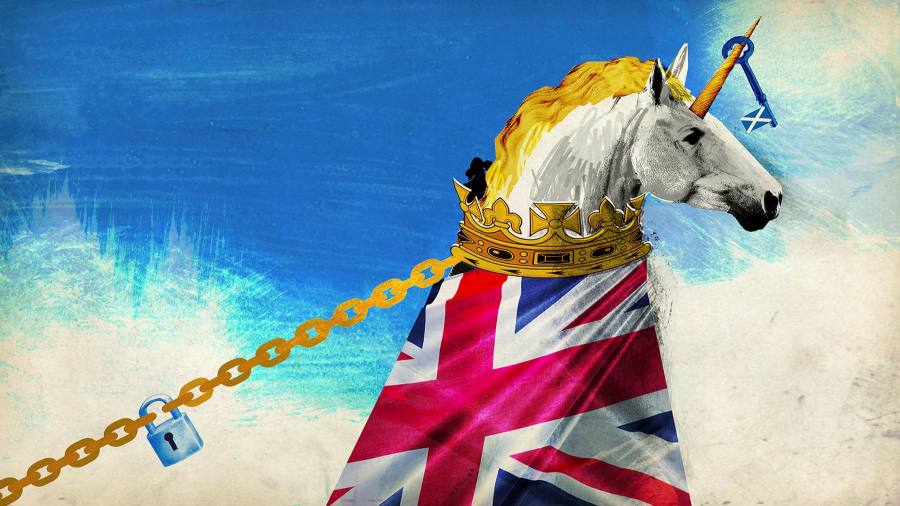[ad_1]
The writer, a former head of the Downing Street policy unit, is a Harvard senior fellow
Prime Minister Boris Johnson stated this week that Scottish devolution has “absolutely not overall†been a disaster. He was trying to distance himself from leaked remarks in November when he told English Tory MPs that devolution had been “Tony Blair’s biggest mistakeâ€. But he was right at the time. Blair’s attempts to defuse nationalism simply inflamed it. Johnson’s contortions show how powerful the nationalists have become.
As a half-Scot, I have sympathy with the desire to assert distinct identities. Yet I have been dismayed to see how poorly the Union has functioned during the pandemic. What should have been a UK-wide effort to combat the virus fell into blaming and squabbling, with the Welsh and Scottish administrations insisting on tighter lockdown policies while relying on financial support from the central government in London.
The administration at Westminster has often felt more like a government of England alone. Devolution is lopsided, with Scottish and Welsh MPs voting on English matters, while English MPs cannot vote on matters reserved to Scotland and Wales.Â
With the Scottish Nationalist party pressing for a second referendum on independence if they win Scotland’s May elections, Johnson must decide whether he has the courage to rewrite the constitutional settlement. This cannot be fudged: the prospects for “global Britain†are unravelling, just when the UK is vulnerable in the world.
Unless Nicola Sturgeon, Scotland’s first minister, is derailed by an inquiry into her government’s handling of complaints about Alex Salmond, her predecessor, she will use a May victory to claim a mandate for a second referendum. Johnson plans to refuse this demand on the basis that the 2014 referendum verdict was meant to last for a generation. But the concern in Downing Street is that Sturgeon will run an advisory referendum anyway.Â
Some of those who want to preserve the Union are urging Westminster to placate the nationalists with something that looks more federal. This would make Scotland, Wales and Northern Ireland self-governing countries in a more equal partnership, co-operating on shared matters. There is logic in the argument that a big offer is needed, since throwing small bones has not quelled the separatist fervour. As former prime minister Gordon Brown has pointed out, the principle of localism is sound: the over-centralisation of power in London hampers local authorities and elected mayors.
But it would be an unworkable federation in which England had roughly eight in 10 of the people and an even higher percentage of gross domestic product. This would necessitate England’s division into regions, something which voters rejected under Blair. It would be a recipe for more layers of government and bureaucracy and more hands held out for subsidies — with the added frustration that the model could make Scotland quasi-independent without having to muster its own military, create its own currency or pay its own way.Â
Clearly, Brexit has changed the equation by riding roughshod over Scottish desires to remain in the EU and boosting pro-independence sentiment. Johnson should call Sturgeon’s bluff over any advisory referendum, since her argument for breaking previous SNP commitments would have no more weight than that of separatists in Catalonia, whose unconstitutional 2017 referendum has left it in limbo. But something needs to be done.Â
One answer would be to introduce a new Act of Union: a much crisper settlement with clear accountabilities. This would define the UK as a unitary state with suitable powers devolved and with due respect for each nation’s identity.
But it would also reassert a British identity and keep ultimate sovereignty at Westminster. The leftwing think-tank Scottish Fabians have proposed such an act, which would also set a higher bar for referendums and have the merit of limiting Downing Street’s ability to make ad hoc changes to suit itself.Â
It would take time to settle the details of which matters would be devolved and which reserved. This could be worked out in something like the “forum of nations†proposed by Brown. Johnson should bite the bullet. As a former mayor of London whose party has pushed forward policies on elected mayors, he knows that the UK is over-centralised. “I think that devolution can work very well,†he said this week. “But it depends very much on what the devolved authorities do.â€
Despite exposing the disjointed nature of the Union, the pandemic has also showed some of its benefits. Vaccines have been invented and procured at UK level, using the heft of the British state.
Johnson will never win over the nationalists. He has presented them with an ideal target to perpetuate the myth that England doesn’t care. But the SNP’s attacks show the emptiness of their case. Their contention that Scotland could thrive outside the Union is unconvincing. It might in fact pay a heavy economic price for secession, no matter how high the SNP’s hopes that Scotland would smoothly join the EU and flourish thereafter.Â
Westminster and the Conservative party have been looking away from the realities of devolution for too long, sleepwalking into disaster. The late Tam Dalyell, a Labour MP, once called devolution “a motorway without exit to a Scottish stateâ€. As we near the final junction, Johnson should hold his nerve. It is time to think big about a new and fair constitutional settlement — but not to cave in to Sturgeon whose party, after all, may not be around forever.
[ad_2]
Source link






